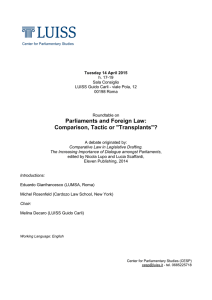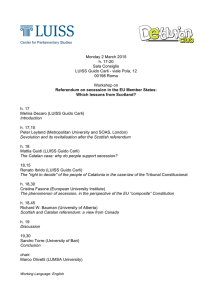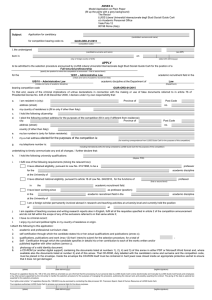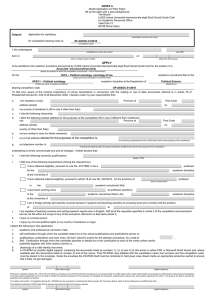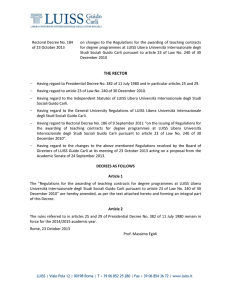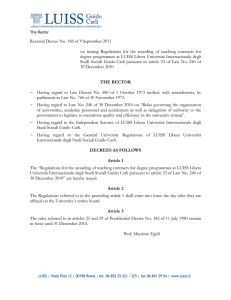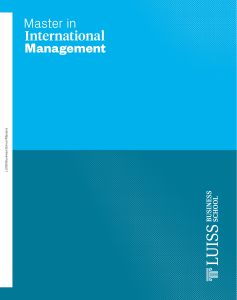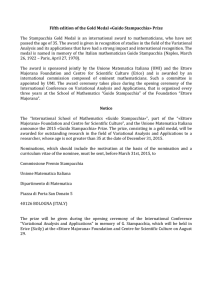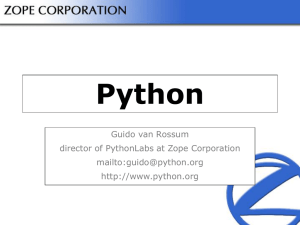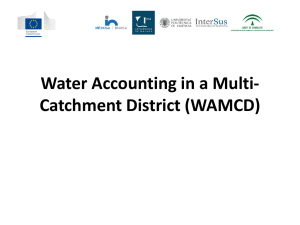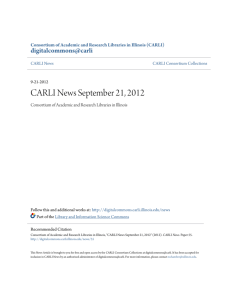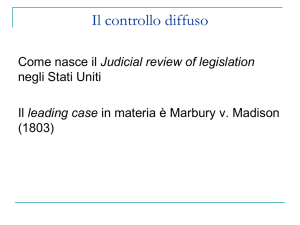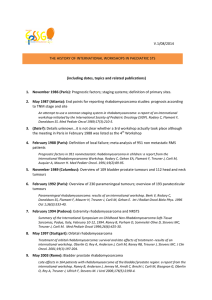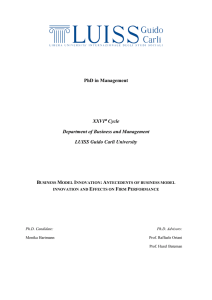abstract
advertisement
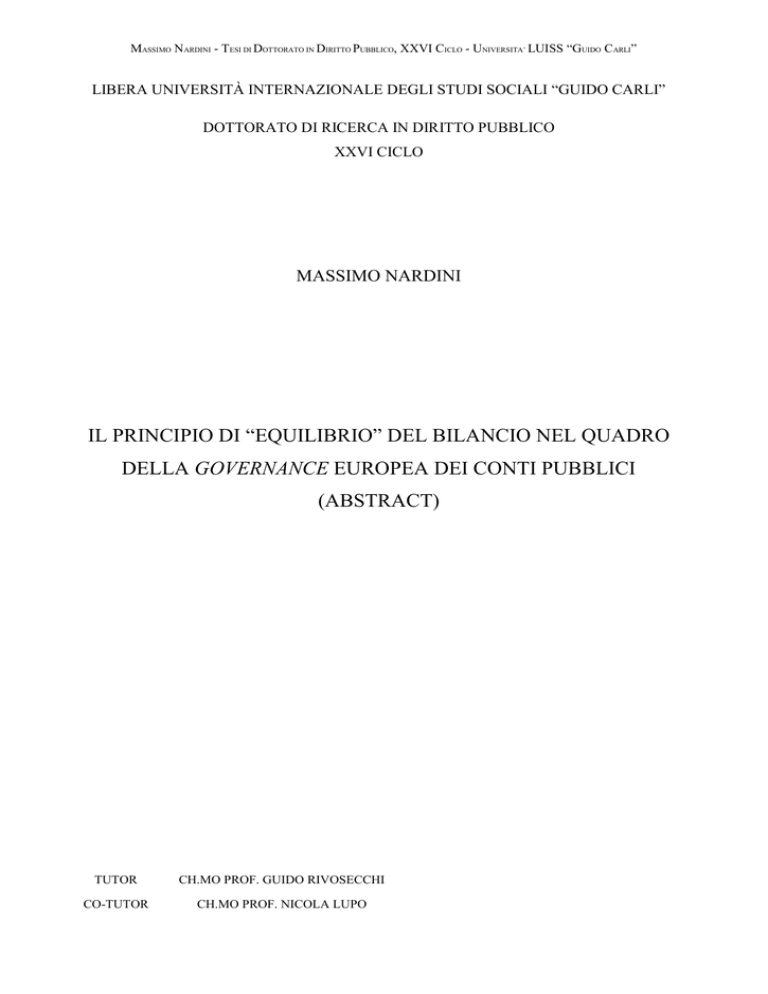
MASSIMO NARDINI - TESI DI DOTTORATO IN DIRITTO PUBBLICO, XXVI CICLO - UNIVERSITA’ LUISS “GUIDO CARLI” LIBERA UNIVERSITÀ INTERNAZIONALE DEGLI STUDI SOCIALI “GUIDO CARLI” DOTTORATO DI RICERCA IN DIRITTO PUBBLICO XXVI CICLO MASSIMO NARDINI IL PRINCIPIO DI “EQUILIBRIO” DEL BILANCIO NEL QUADRO DELLA GOVERNANCE EUROPEA DEI CONTI PUBBLICI (ABSTRACT) TUTOR CH.MO PROF. GUIDO RIVOSECCHI CO-TUTOR CH.MO PROF. NICOLA LUPO MASSIMO NARDINI - TESI DI DOTTORATO IN DIRITTO PUBBLICO, XXVI CICLO - UNIVERSITA’ LUISS “GUIDO CARLI” ABSTRACT The Italian Constitutional reform in 2012 which has introduced the balanced budget principle is caracterized by complexities more than other constitutional changes adopted in the past, due to the fact that it doesn’t imply only juridical issues but also economic theories, institutional problems, procedural limits: moreover, the implications of this change in the budgetary rules cannot be limited only to the national context but has to be referred to the European multi-level system. The balanced budget principle has been debated by economic literature, from the Keynesian theories to the contractarian paradigm of the Public Choice School. Also the wicksellian principles and the theoretical approach of the Italian School of Public Finance on budget policy have been exposed in this research. This has allowed not only to highlight the basic principles which J. Buchanan has referred to in its elaboration of the budgetary constitutional rule, but also to focus on the interaction between economic decisions and institutional system, which had inspired the elaboration of the art. 81 of the Italian Constitution during the working of the Italian Constitutional Assembly in the 40s. Rather than imposing a balanced budget rules, the new Republican Constitution had established the necessity of financial coverage of the spending laws that involve new or greater expenditures. Financial coverage for new laws represents the application of the wincksellian “value and countervalue” principle, which is different than the balanced budget rule. In the present research, this distinction has been referred, respectively, to the “obligation by contents” and the “obligation by procedures”: following the Stability and Growth Pact as modified by the Six pack and the Two pack, even stricter financial targets have been imposed to the EU member States. By contrast, the provisions of the Pact which have modelled the European economic governance are acquiring more and more importance: in the short run, they imply losses of sovereignty by the States in the fiscal domain, but in the medium term this normative solution could allow them to elaborate its own financial policy, in accordance with the European institutions. If budgetary rules are a matter of credibility, the “European semester” could realize the coordination of national fiscal policy which is necessary in the absence of a communitarian budget, in place of the mere application of the actual constraining rules, with negative effects on the general economy. It’s important to consider that budget and economic cycle are strictly connected, through the functioning of the so called “automatic stabilizers”: the budgetary rules should aim at changing preferences of short-sighted politicians, that is it should enforce responsibility and transparency in MASSIMO NARDINI - TESI DI DOTTORATO IN DIRITTO PUBBLICO, XXVI CICLO - UNIVERSITA’ LUISS “GUIDO CARLI” the public decisions, rather than following the “leviathan idea” of the State to be constrained as much as possible. That was the ratio of the original art. 81, and in the present work it has been demonstrated that also the constitutional reform in 2012 has maintained this approach, at least for the central government. Actually, even if the reform in argument has been forced by market pressures and European financial constraints, the way followed by the Italian Legislator appears to be in line with the national juridical traditions and political praxies, as well as the jurisprudence of the Supreme Court: this is why in the text of the constitutional Law n. 1 of 20 April 2012 and, notably, in the contents of the Law n. 243 of 24 December 2012 the financial discipline has been referred to the “equilibrium” principle rather than the “balanced-budget” one. So, these laws seem to be more flexible and dynamic, providing procedural commitments for policy-makers rather than specific targets on the main financial aggregates. Finally, attention has been paid to the European context, where the economic governance has been empowered in the last three years, so as to reinforce procedural obligations for Member States as well the financial limits on national deficit and public debt. The basic problem is that European Union is missing financial resources which could permit the adoption of expansionary fiscal policies, given that the economic crisis and the medium term objective of the balanced budget imposed to the Member States cannot allow them to use public expenditure to stimulate growth and, at the same time, they force them to implement restrictive policies in order to reduce the budget deficit. The European economic governance, by restraining the sovereignty of the States in the domain of fiscal policy, could create a new place where financial decisions could be taken, following an agreement year by year between national authorities and the European institutions. In this context, the analysis has been focused on parliamentary cooperation which can facilitate this process, especially for national Parliaments, whose powers have been modelled in the past according to the principle of no taxation without representation and today need to reinvent their role in the national arena as well as in the EU level.
